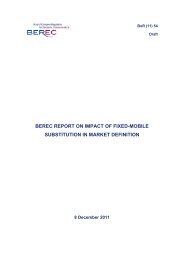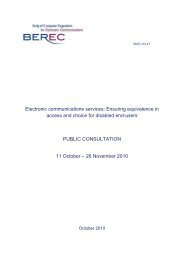Vodafone response to the public consultation by ... - BEREC - Europa
Vodafone response to the public consultation by ... - BEREC - Europa
Vodafone response to the public consultation by ... - BEREC - Europa
You also want an ePaper? Increase the reach of your titles
YUMPU automatically turns print PDFs into web optimized ePapers that Google loves.
All statistics from <strong>the</strong> Commission mentioned in <strong>the</strong> previous paragraphs show that <strong>the</strong> overall<br />
picture of broadband take-up and general internet use is broadly positive.<br />
While still gaps and differences between age, income, education groups and countries still remain,<br />
all segments show positive growth in terms of take-up and usage. This means that it is not yet clear if<br />
government initiatives <strong>to</strong> stimulate demand are necessary or if technological and market trends will<br />
simply solve <strong>the</strong> issues <strong>by</strong> <strong>the</strong>mselves.<br />
In 2010, <strong>Vodafone</strong> has asked <strong>to</strong> Plum 13 <strong>to</strong> look at <strong>the</strong> demand side measures that could be put in<br />
place <strong>to</strong> stimulate demand. The market trends and technological developments mentioned above<br />
show that large scale measures may not be needed anymore, but <strong>the</strong> recommendations <strong>to</strong><br />
Governments contained in <strong>the</strong> paper are still valuable:<br />
� Governments should target incentives in a more systematic and rigorous way. Above all <strong>the</strong>y<br />
need <strong>to</strong> make rigorous, ex -post evaluations of effectiveness a condition for funding<br />
programmes of demand-side measures<br />
� They should look critically at programmes of demand-side measures aimed at <strong>the</strong> over 25s<br />
who are poorly educated before funding <strong>the</strong>m. When based around traditional technologies<br />
such programmes are costly and slow <strong>to</strong> take effect<br />
� In dealing with this group Governments should take advantage of current market trends<br />
such as <strong>the</strong> take-up of mobile broadband and smartphones, <strong>the</strong> introduction of Internet<br />
access via televisions and ebook readers, <strong>the</strong> move from browsers <strong>to</strong> applications, and <strong>the</strong><br />
trend <strong>to</strong>wards cloud computing. These all reduce <strong>the</strong> skills needed <strong>to</strong> use <strong>the</strong> Internet and<br />
<strong>the</strong> cost <strong>to</strong> end users of doing so. They should refuse <strong>to</strong> fund programmes which fail <strong>to</strong> take<br />
account of <strong>the</strong>se trends<br />
� In general <strong>the</strong>y should give <strong>the</strong> 25 <strong>to</strong> 54 year age group higher priority than <strong>the</strong> over 55s.<br />
The former group will be Internet users for longer and, once users <strong>the</strong>mselves, can<br />
potentially support <strong>the</strong>ir parents <strong>to</strong> become Internet users<br />
� To deal with affordability barriers, governments should design universal broadband policies<br />
which allow non-users <strong>to</strong> choose appropriate broadband packages from fixed and mobile<br />
offerings. This may mean switching subsidies from <strong>the</strong> supply-side <strong>to</strong> <strong>the</strong> demand-side<br />
� Governments should encourage <strong>the</strong> development of services which allow those currently<br />
without debit or credit cards <strong>to</strong> carry out e-transactions.<br />
Fast broadband – supply side issues<br />
A large part of <strong>the</strong> current <strong>public</strong> policy debate in <strong>the</strong> electronic communications sec<strong>to</strong>r is dedicated<br />
<strong>to</strong> identifying <strong>the</strong> best way <strong>to</strong> facilitate investment in new fast broadband services mainly based on<br />
fibre-optic networks. The substantial investment involved and economic unsustainability of network<br />
duplication (i.e. natural monopoly is likely in most areas) require innovative ways <strong>to</strong> guarantee<br />
competition and ensure investment. <strong>Vodafone</strong>’s views on <strong>the</strong> matter are well-known. We believe<br />
that <strong>the</strong> best solution are co-investment initiatives where <strong>the</strong> market participants share <strong>the</strong> risk<br />
13 See<br />
http://www.vodafone.com/content/dam/vodafone/about/<strong>public</strong>_policy/policy_papers/<strong>public</strong>_policy_series_10.p<br />
df<br />
9





